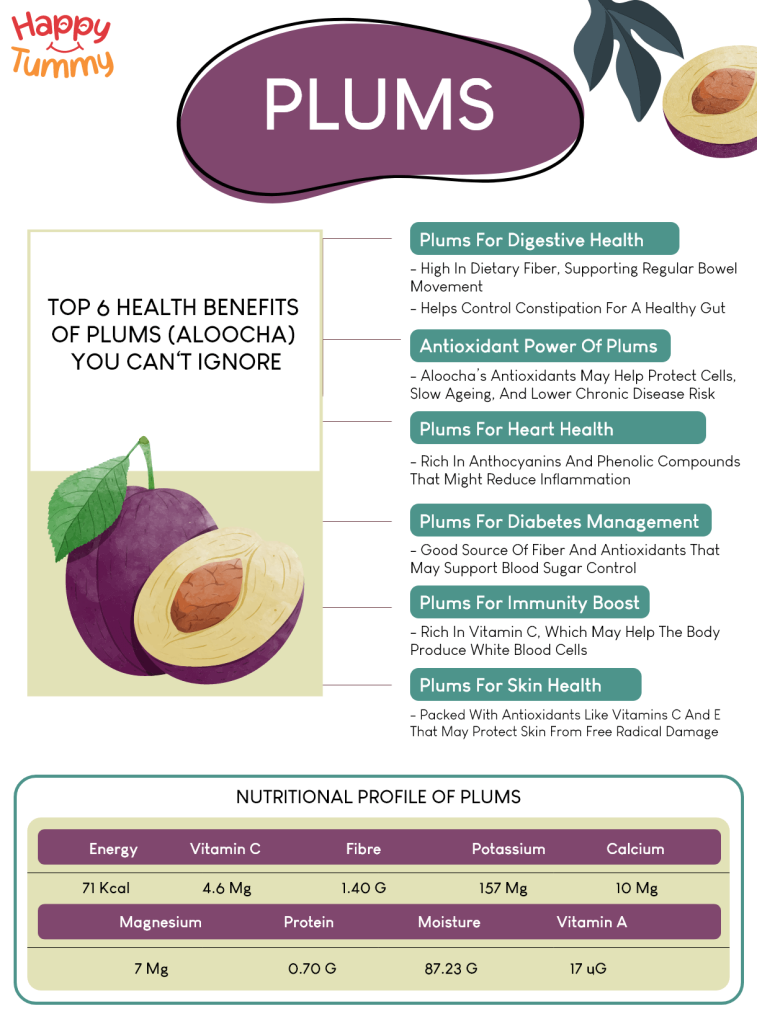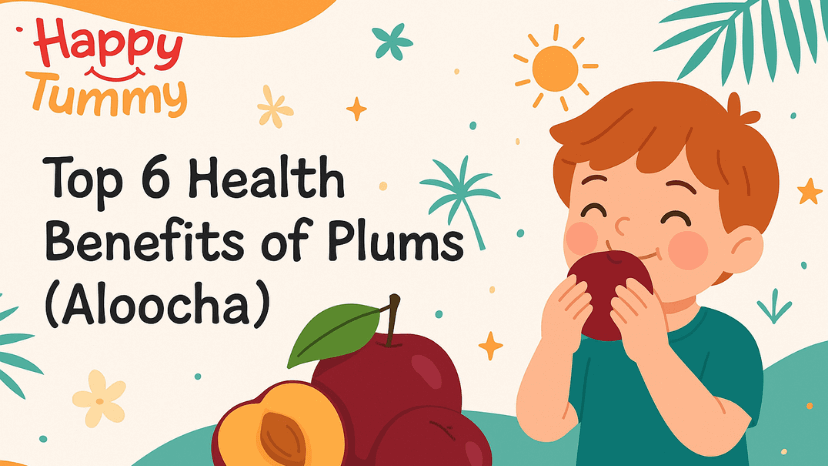Table of Contents
Plums, known as aloocha in most regions, are far more than an excellent, juicy snack. This sweet and sour infusion is dense, rich in nutrition, and oozing with colour. Stuffed with vitamins, antioxidants, and fibre, plums become a viable natural support to many common health issues, such as improved digestion and cardiovascular health.
Besides their magnificent taste, aloocha contains a decent amount of nutrients, including Vitamin C, Vitamin K, and potassium, which makes them more valuable as part of a healthy diet. Plums can be part of a healthy lifestyle, whether you eat them, use them as a snack, or add them to your drinks.
Here, we explore the top 6 health benefits of plums, so you can see why you should include this versatile fruit in your basket of products.
Nutritional Profile of Plums (Per 100g)
As for their nutritional content, plums are rich in vitamins, minerals, fibre, and antioxidants, thus a good solution for overall wellness. The fibre part facilitates digestion, and antioxidants help prevent body damage by free radicals.
The nutritional breakdown of plums that support these benefits is given below[1]:
| Nutrient | Amount (per 100g) |
| Energy | 71 kcal |
| Moisture | 87.23 g |
| Protein | 0.70 g |
| Total Fat | 0.30 g |
| Carbohydrates | 11.63 g |
| Fiber | 1.40 g |
| Calcium | 10 mg |
| Phosphorus | 13 mg |
| Iron | 0.20 mg |
| Magnesium | 7 mg |
| Sodium | 1 mg |
| Potassium | 157 mg |
| Vitamin C | 4.6 mg |
| Vitamin A | 17 µg |
| Folate | 0.03 mg |
| Vitamin A | 0.75 µg |
| Folate | 5.00 µg |
Health Benefits of Plums
Plums are spherical, small fruits with smooth, shiny skin that is deep purple, red, or yellow, depending on the variety. The inner flesh is usually juicy and tender, varying from golden yellow to deep red.
Taking a bite out of a plum, you will taste a combination of sweet and tart that is delicious and refreshing.
Let us discuss how plums can be good for your health.

#1 Plums for Digestive Health
Plums are great for your digestive system because they contain high fibre. Consuming enough dietary fibre supports regular bowel movements and can help control constipation, promoting healthy gut function.
Moreover, plums are a good source of sorbitol, a natural sugar alcohol that may enhance colon hydration, ease stool softening, and promote regular bowel function. However, excessive consumption may cause digestive discomfort in sensitive individuals. Thus, aloocha’s soluble and insoluble fibre mix might help build digestive health.[2]
Aashirvaad Atta and a team of expert nutritionists have devised the Digestive Quotient, which will check your digestive score out of 100. Take this quick 2-minute test to know your Digestive Quotient
#2 Antioxidant Power of Plums
Plums are rich in antioxidants, especially anthocyanins, which may scavenge free radicals that can damage your cells. Free radicals are unstable molecules that damage cells, contributing to ageing and various diseases.[3]
Antioxidants manage free radicals, reduce oxidative stress, and may support body well-being. Very dark-coloured plums are rich in anthocyanins, a bioactive component class that gives the fruit vibrant colour and rich antioxidant properties.[4]
Thus, aloocha’s antioxidant effects may also prevent cells from being harmed, slow down the ageing process, and reduce the risk of chronic disease.
#3 Plums for Heart Health
Due to their potassium, antioxidants, and fibre, plums may help maintain heart health when consumed as part of a balanced diet and lifestyle. Plums are also rich in antioxidants such as anthocyanins and non-enzymatic compounds like phenolic, which might inhibit inflammation and defend the cardiovascular system from free radical-induced cell damage. [5] .
Adding some plum consumption to your diet may be one of the tastiest and most healthy things to do for your heart, and capitalise on the natural goodness available in this colourful fruit.
#4 Plums for Diabetes Management
If consumed in moderate amounts, plums can be a beneficial addition to a diet for individuals with diabetes. These spherical fruits contain a good amount of fibre and are rich in antioxidants, so they may support blood sugar levels and provide a sweet and healthy snack.[6] .
The high antioxidants in it may help protect cells and support heart and bone health.[7] Portion control, however, is essential, and if you add plums to your diet, it’s wise to watch your blood sugar levels to ensure they are balanced.
Always consult a healthcare provider before making any dietary changes, especially when managing diabetes.
You may not be able to plan healthy meals or know how to add fibre, but think about whom to consult and what to do with it. Aashirvaad Atta, Multigrains, and its specially trained nutritionists developed the My Meal Plan test. Under this test, you get your daily dose of fibre and an adequate eating plan to allow you to cover the requirements.
#5 Plums for Immunity Boost
Plums contain nutrients that may help and support the immune system. Being rich in vitamin C, they support the body in making white blood cells, which may help fend off infections. [8]
Besides vitamin C, plums contain antioxidants, including anthocyanins, quercetin and phenolic compounds, that may neutralise free radicals and help immune cells. Plums’ deep-purple colour is attributable to their anthocyanin content, which may manage inflammation and support the immune system’s health. Plums are generally beneficial for overall health and support the immune system.[9]
#6 Plums for Skin Health
Plums are a nutrient-packed fruit that can assist your skin in diverse ways. As a good source of antioxidants (vitamin C and E), they may help the skin guard against the damage caused by free radicals.[10]
Vitamin C may also increase collagen production, the protein responsible for keeping the skin firm and elastic. It is essential for healthy skin and is abundant in the allocha [11]. .
Plums can help to keep the skin moisturised and plump. Thus, adding plums to the diet in fresh forms along with proper diet and lifestyle can support the skin’s natural radiance.
Incorporating Plums into Your Diet:
Some of the ways of including plums in your diet are:
- Fresh plums: Eat them as a healthy mid-day snack or sprinkle them on your salads, bowls of fruits, or blend them in your smoothies.
- Plum juice: Containing much vitamin C and antioxidants, plum juice can also make an excellent, vitamin-rich drink.
- Dried plums (prunes): A good source of fibre, prunes can be mixed with oatmeal or yoghurt or eaten as a fibre-filled snack.
- Plum jam or compote: Spread on toast or use as a topping for ice-cream or pancakes.
- Baked goods: Add plums to your muffins, cakes, or tarts for a healthy alternative taste.
However, since plum jam juice or compote has more sugar, you should limit yourself to moderate amounts to keep your sugar intake under control.
Wrap-Up
Plums are yummy and even healthy fruits that can effortlessly become a part of your daily nutrition and provide many health benefits. From improving digestion to stimulating immunity, plums are sure to benefit the heart and skin.
Nevertheless, maintaining a balanced diet is crucial for maintaining good health and overall well-being. Although plums have many advantages, they should be consumed with other fruits, vegetables, proteins, and whole grains.
If you have any specific dietary concerns or questions, we have a certified nutritionist available to help you make informed decisions based on your individual health needs.
Frequently Asked Questions
Plums are full of antioxidants, vitamins, and fibre, which can help support good digestive health, promote a healthy heart, and promote healthy skin.
Plums contain balanced calories and fibre, which can help you feel full and control your weight when eating plums as part of a balanced diet.
Dried plums, or prunes, are concentrated forms of fresh plums. They are high in fibre and can aid digestion and relieve constipation. However, dried plums are higher in GI than fresh plums.
Fresh plums can be stored in the refrigerator for an extended period, although they can also be stored at room temperature. If you don’t want the plums to ripen quickly, store them in the refrigerator..
Plums have a low to moderate glycemic index, meaning they can cause a sluggish spike in blood sugar levels compared to foods with a high glycemic index. This makes them a good option for managing blood sugar levels in moderation.















